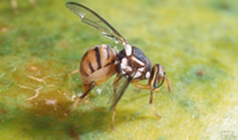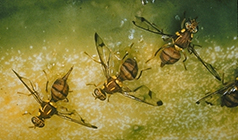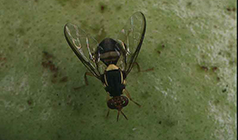Read the latest information on
Foot-and-mouth disease

Oriental fruit fly, Bactrocera dorsalis. Photo by Scott Bauer
Exotic fruit flies are ranked #4 in the list of National Priority Plant Pests. The good news is that efforts to stop exotic fruit flies from entering the Australian mainland through the Torres Strait will continue with a five-year response plan.*
A quick look at a map shows how the proximity of Torres Strait to Papua New Guinea poses a unique and serious biosecurity risk to Australia. Pests, like exotic fruit fly, that are native to Papua New Guinea can move into the Torres Strait by natural means, such as wind currents, and also through human assisted pathways such as vessel movements and unauthorised foreign fishing activity.
Producers in the north of Australia may remember an incursion in 1996 of Asian papaya fruit fly, now known as Oriental fruit fly. The response at the time was successful in eradicating the pest, and afterwards a long-term strategy was adopted to exclude exotic fruit fly present in Papua New Guinea and prevent them from entering and becoming established on the Australian mainland via Torres Strait.
The containment strategy continually proved to be effective and provided benefits to horticultural industries. In 2015 the strategy transitioned to a response plan under the Emergency Plant Pest Response Deed with co-investment in the cost of eradication shared between governments and beneficiary industries.

Melon fly, Bactrocera cucurbitae. Photo by Florida Division of Plant Industry Archive, Florida Department of Agriculture and Consumer Services, Bugwood.org
The response plan targets three exotic fruit flies:
These pests are of particular concern because, unlike Queensland fruit fly which producers are familiar with, they can also affect several types of immature or hard green fruit. Green bananas, for example, are not a host of Queensland fruit fly, but Oriental fruit fly can attack green bananas.

New Guinea fruit fly, Bactrocera trivialis. Photo by the Secretariat of the Pacific Community and Contributors
The aim of the seasonal response is to monitor and eradicate these pests in Torres Strait before they can become established and have a major impact on trade and production.
Based on technical advice and trapping data, it is predicted that without these activities, exotic fruit fly incursions on mainland Australia would likely occur within 12-18 months. This scenario would carry a potential eradication cost many times the amount currently invested in the response plan.
Fruit fly monitoring in Torres Strait is also part of a broader national fruit fly trapping network to provide early warning of fruit fly pests and supports crucial market access for Australian horticultural exports.
 Anyone with trees or crops that are hosts to fruit fly need to be vigilant to signs of fruit fly infestation. If you think you have seen an exotic fruit fly, you need to report it to the Exotic Plant Pest Hotline on 1800 084 881. This number will put you in touch with your local department responsible for biosecurity.
Anyone with trees or crops that are hosts to fruit fly need to be vigilant to signs of fruit fly infestation. If you think you have seen an exotic fruit fly, you need to report it to the Exotic Plant Pest Hotline on 1800 084 881. This number will put you in touch with your local department responsible for biosecurity.
Fruit flies become active after periods of rain or high humidity. To prevent fruit fly outbreaks, do not allow fallen fruit to accumulate under trees. Always pick up fallen fruit and put it in a sealed bag before you dispose of it.
If you’re travelling interstate, be aware that there are restrictions on the movement of fruit across state and territory borders. Check the Australian Interstate Quarantine website before you travel.
*endorsed by the National Management Group on 28 June 2021
How we respond to outbreaks (National pest and disease outbreaks)